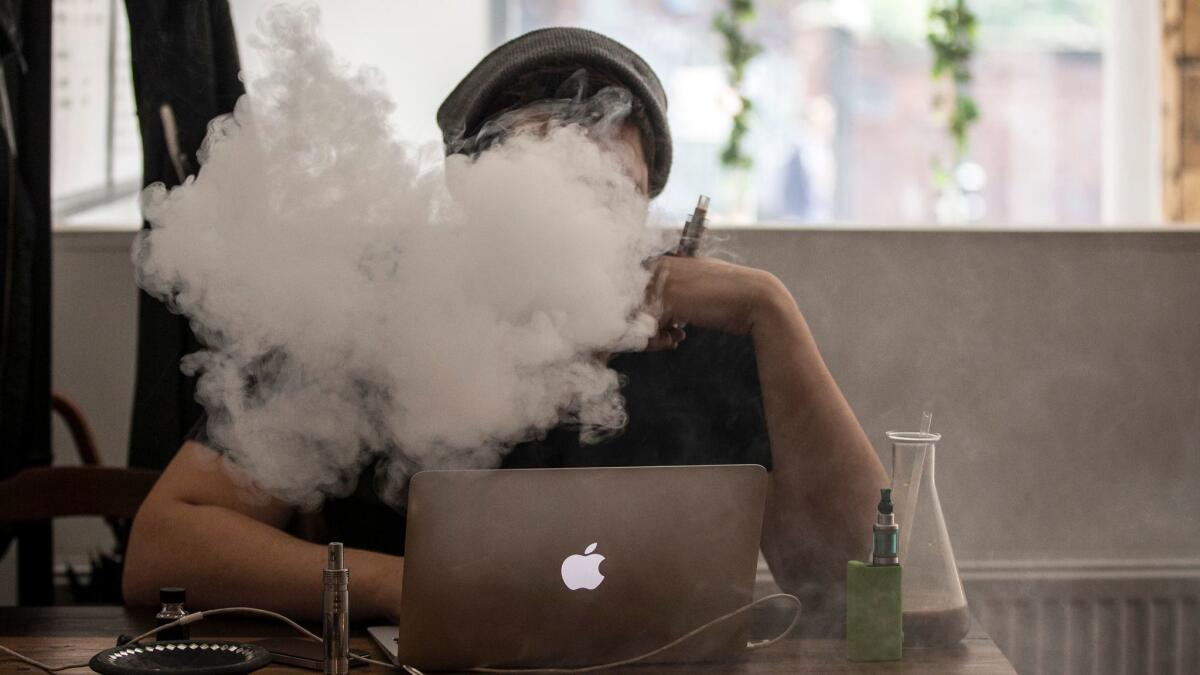San Francisco’s e-cigarette ban was bad. The industry’s fix is worse.

- Share via
After San Francisco County supervisors voted to ban electronic-cigarette sales earlier this year, the nation’s largest seller of e-cigarettes, Juul Labs, financed a local ballot measure to try to overturn the ban in the Nov. 5 municipal election.
The original prohibition on sales of electronic-cigarette products in stores and online, which is scheduled to go into effect Jan. 1, is an overreach and generally bad policy. Although intended as an effort to curb teen vaping, which is all too common despite being illegal under California law, it penalizes legal adult users as well by forcing them to travel to other cities to buy electronic cigarettes, while leaving indisputably unsafe conventional cigarettes on store shelves.
Nevertheless, Juul’s repeal-and-replace measure, Proposition C, is even worse. It presents itself as a seemingly reasonable proposal to replace the ban with new regulations that mostly focus on making it harder for minors to get their hands on vaping products. But it would forbid the city’s elected officials from amending those rules without approval from voters — an unreasonable hurdle, given how much we’re still learning about e-cigarettes — and worse, it would most likely invalidate the city’s ban on flavored electronic-cigarettes passed by voters last year. That’s a step too far.
Ultimately, both the city’s ban and Proposition C may be largely moot by next year. The sales prohibition is really a moratorium that applies only to vaping products that don’t have approval from the Food and Drug Administration, which is slated to begin pre-market review of electronic cigarettes in March. Meanwhile, the FDA is preparing to pull candy- and fruit-flavored vaping products from the shelves nationwide in coming weeks amid a national outbreak of vaping-related lung injuries, and California Gov. Gavin Newsom said he will urge the Legislature to pass a ban on flavored electronic cigarettes next year.
But there’s a principle at stake in this election that makes it worthwhile for San Franciscans to vote “no” on this measure. Ballot initiatives are meant to be tools for citizens to make new laws or overturn laws they don’t like, not as weapons to help deep-pocketed industries protect their bottom lines from regulation. Proposition C isn’t a grass-roots effort, no matter how the ads portray it. It was financed almost entirely by San Francisco-based Juul, which spent more than $10 million getting the measure qualified and blitzing the city with mailers, billboards and TV ads. (Ads, we should point out, that are under investigation by the FDA for making unauthorized health claims. )
In a surprise change of heart, Juul walked away from Proposition C last week, announcing that it was suspending active support for the measure. The campaign was terminated, and campaign officials said the billboards and website would be shut down by the end of the week. (The website, Regulatenotban.com, remained live on Friday afternoon, however.) It’s a positive move, though not necessarily one that was made for the right reasons.
The company said the decision was part a “broad review of the company’s policies” undertaken by newly appointed Chief Executive K.C. Crosthwaite. We suspect that the decision was influenced, at least in part, by current events. In recent months, at least 1,080 people have been hospitalized with lung injuries, and 18 people have died. Health officials have yet to conclusively identify the cause of the illness, though authorities suspect chemical exposure. Most of the cases involved vaping cannabis oil as well as nicotine. Still, authorities aren’t taking chances and have warned the public that the safest approach is to avoid vaping anything until they know the cause. (Even so, they are also advising adult vapers who switched to electronic cigarettes to kick their pack-a-day habit not to return to conventional cigarettes for their nicotine fix. How’s that for a mixed message?)
It couldn’t have helped the prospects for Proposition C when billionaire former New York Mayor Michael Bloomberg decided to get into the fight in September, dropping $4.6 million into the No campaign. Furthermore, a Probolsky Research poll found that 58.6% of San Francisco’s voters are opposed to the measure.
Juul may be on the retreat in this election, but that doesn’t mean it won’t try again to override local efforts to curb vaping. For that reason, we hope San Francisco’s voters will still turn out on Nov. 5 to reject Proposition C and send the message that they aren’t about to let Big Tobacco (Altria, the maker of Marlboro brand cigarettes, owns 35% of Juul) or any other business subvert democracy for its own ends.
More to Read
A cure for the common opinion
Get thought-provoking perspectives with our weekly newsletter.
You may occasionally receive promotional content from the Los Angeles Times.









